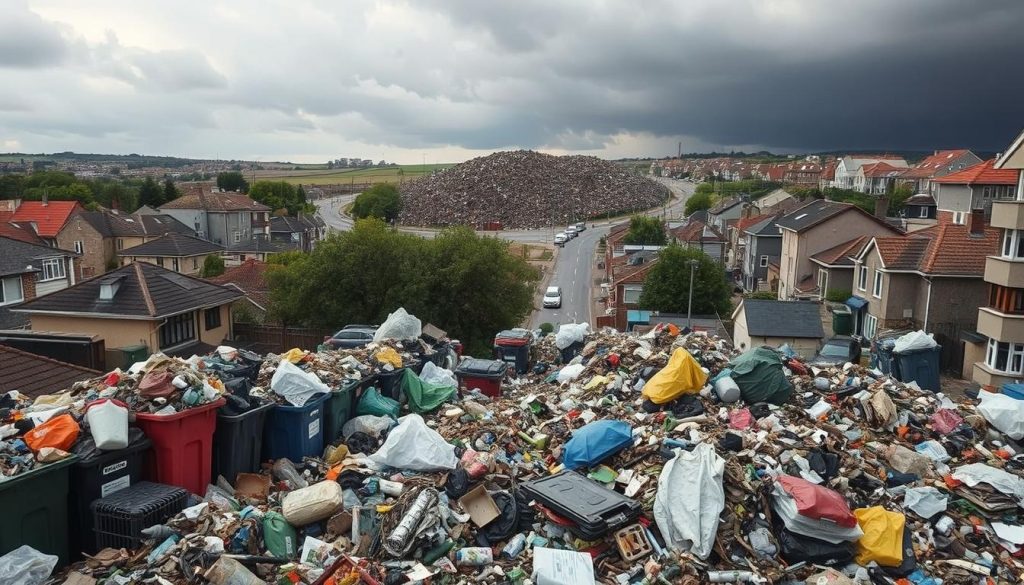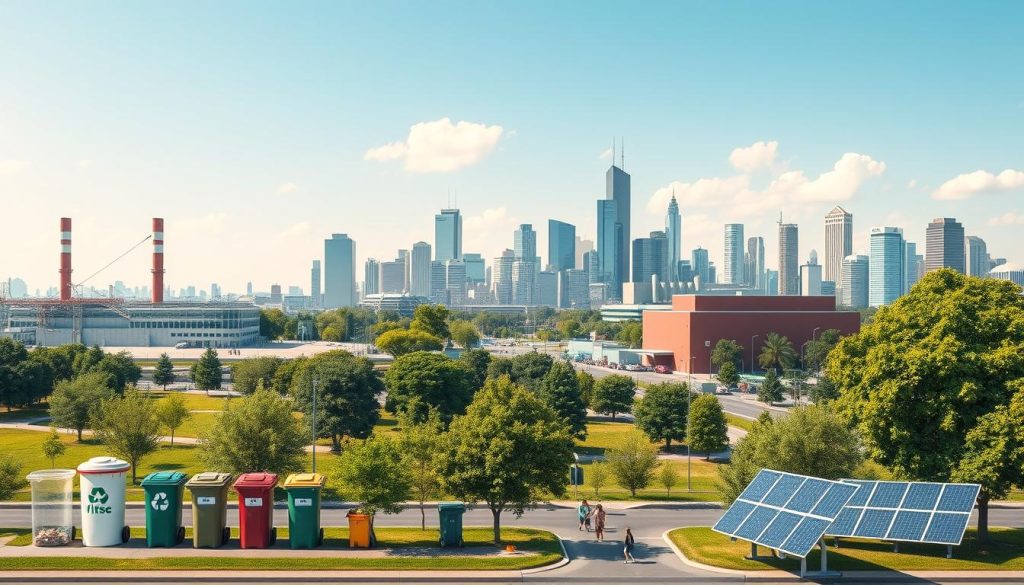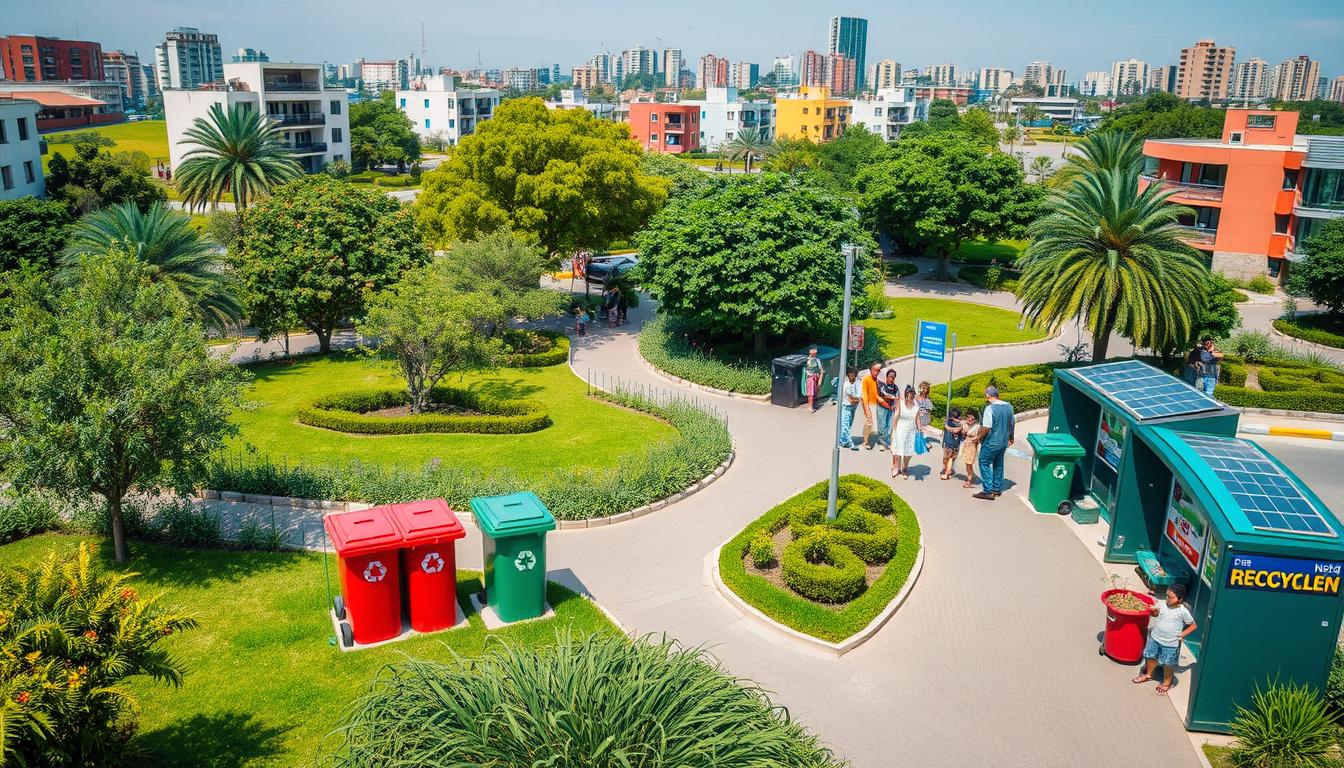Waste management policies are key to a greener future. They help both the environment and our communities. These rules, set by groups like the United States Environmental Protection Agency (EPA), guide how we deal with waste. This includes everything from household trash to industrial and hazardous waste.
Strong waste management policies help reduce harm to our planet. They also save important resources. It’s more than just cutting down on waste. It’s about building a better world for everyone. Let’s dive into how good waste management can change things for the better.
Understanding Waste Management Policies
Waste management policies are plans and laws made by governments and groups. They cover waste from start to end. These rules include how to sort, collect, treat, and dispose of waste safely.
What are Waste Management Policies?
Waste management policies are detailed rules for handling waste. They cover local, national, and global areas. These rules mix environmental laws and waste handling guidelines to manage waste well and sustainably.
For example, the Resource Conservation and Recovery Act (RCRA) in the U.S. sets strict rules. It aims to make waste management better through strong regulations.
Importance of Effective Policies
Good waste management policies are very important. They help protect our environment and health. They also help save resources and move towards a circular economy.
Following these guidelines cuts down pollution and saves natural resources. It also lowers carbon emissions. Plus, these policies help improve waste handling over time. They encourage new ideas and work towards a greener future.
- Mitigate environmental impact: Effective waste management policies help prevent contamination of air, water, and soil.
- Support public health: Proper waste disposal ensures reduced exposure to hazardous materials.
- Encourage recycling and resource conservation: Policies promote recycling initiatives and resource efficiency.
- Compliance with environmental regulations: Ensures adherence to local, state, and federal waste disposal guidelines.
- Foster economic benefits: Reduced waste management costs and job generation in recycling and waste management sectors.
The Key Components of Waste Management Policies
Effective waste management policies have three main parts: reducing waste, recycling, and proper disposal. These parts work together to manage waste well and help the environment.
Waste Reduction Strategies
Reducing waste is the first step. It includes making packaging smaller and teaching people to waste less. This way, we make recycling and disposal easier.
Recycling Programs
Recycling is key in managing waste. It helps get materials back into use and saves resources. Many places have simple recycling programs to get more people involved.
Disposal Methods
When we can’t reduce or recycle, we need good disposal methods. Landfills and incineration are used to lessen harm to the environment. The EPA shows the best order for these methods to follow.
| Component | Description | Examples |
|---|---|---|
| Waste Reduction Strategies | Methods to reduce waste at the source | Packaging design changes, consumer education |
| Recycling Programs | Initiatives to reclaim and reuse materials | Single-stream recycling, public participation campaigns |
| Disposal Methods | Techniques to manage and dispose of remaining waste | Sanitary landfills, incineration |
Benefits of Implementing Strong Waste Management Policies
Effective waste management policies bring many benefits. They help the environment, boost the economy, and improve health. This creates a sustainable cycle where resources are used wisely.
Environmental Advantages
Strong waste policies lead to less landfill use. This saves land and prevents water pollution. Recycling also helps, by using materials again instead of throwing them away.
This approach protects nature and keeps ecosystems healthy. It’s good for all living things.
Economic Benefits
Waste management policies also help the economy. Recycling creates jobs and supports local businesses. The EPA’s Jobs through Recycling program shows how recycling can lead to more jobs.
These policies also save money. They reduce the need for new materials and lower waste disposal costs.
| Economic Benefit | Description |
|---|---|
| Job Creation | New employment opportunities in recycling and material recovery sectors. |
| Cost Savings | Reduced expenses from lesser demand for new raw materials and minimized waste disposal costs. |
Community Health Improvements
Good waste policies also improve health. They reduce pollution and make living areas cleaner. The World Health Organization says cleaner environments lead to fewer health problems.
Cleaner air, soil, and water mean healthier people. This improves life quality for everyone.
Challenges in Waste Management Policies

Creating effective waste management policies is tough. Many challenges need to be addressed to make waste management programs work well. These programs must also follow important waste management laws.
Common Obstacles
One big problem is technology. Many waste management programs need advanced tech that’s expensive and hard to set up. Also, getting people to follow waste rules is hard. Some people don’t know or care about proper waste disposal, leading to illegal dumping and wrong waste sorting.
- Technological Barriers
- Financial Constraints
- Public Non-compliance
- Illegal Dumping
- Lack of Infrastructure
Balancing Cost and Compliance
Another big challenge is balancing costs with following the law. Making waste management programs that meet legal standards can be pricey. For example, laws like the Clean Air Act and Clean Water Act have strict rules. These rules help protect the environment but can make it costly for cities and companies to follow them.
| Legislative Framework | Challenges |
|---|---|
| Clean Air Act | Costly technological investments and operational changes |
| Clean Water Act | High compliance costs and complex regulatory requirements |
It’s important to find a balance for waste management programs to succeed. Policymakers must think about the costs and the need to protect the environment. This way, waste management systems can be both effective and affordable.
Innovative Approaches to Waste Management

Waste management is changing fast, thanks to new ideas and technology. These changes are making waste handling better and getting more people involved. New tech is making old ways of handling waste outdated.
Technology in Waste Management
Waste-to-energy plants and composting facilities are leading the way. They turn waste into useful things and cut down on landfills. Smart bins and robots help sort waste better.
These tools, like solar-powered compactors and recyclables sorters, make waste handling safer and more efficient.
Community Engagement Initiatives
Getting people involved is key to good waste management. Programs like recycling workshops and clean-up events help. They teach people how to reduce waste and make them want to help.
Case Studies of Successful Policies
San Francisco’s goal to send zero waste to landfills is a great example. They use new tech and get people involved. This has led to more recycling, less waste, and a more aware community.
| City | Technology Implemented | Community Engagement Initiatives | Outcome |
|---|---|---|---|
| San Francisco | Waste-to-Energy Plants, Smart Bins | Recycling Workshops, Local Clean-Up Events | Achieved significant waste reduction, high recycling rates |
| New York | Automated Recyclables Sorters | Community Recycling Projects, Educational Campaigns | Improved sorting efficiency, increased public participation |
| Seattle | Composting Facilities, Solar-Powered Compactors | Green Initiatives, School Programs | Enhanced composting processes, greater community awareness |
The Role of Legislation in Waste Management

Legislation is key in improving waste management by setting rules for sustainable practices. Federal regulations are especially important. They create standards for handling, cleaning up, and treating waste nationwide.
Federal Regulations
Federal rules are the backbone of waste management in the U.S. The Environmental Protection Agency (EPA) enforces these rules. They focus on hazardous waste, recycling, and using waste as energy. Following these rules is crucial for protecting the environment and public health.
State and Local Guidelines
While federal rules cover the basics, states and local areas can add their own touches. States can make their own laws to tackle local issues. Local governments then fine-tune these laws with their own programs and campaigns. It’s important to know both state and local rules to manage waste well.
Upcoming Legislative Changes
Staying updated on new laws is essential for waste management. Changes might include stricter rules on plastics, mandatory recycling, and more responsibility for product makers. Also, there will be new goals for using renewable energy in waste management. These changes will push for more innovation and green practices.
How I Can Contribute to Effective Waste Management
Every person can help improve waste management. Simple actions can make a big difference. This section will share tips on reducing waste, joining community efforts, and pushing for better policies.
Personal Waste Reduction Tips
There are many ways to cut down on waste. Composting organic waste reduces landfill material and methane emissions. Sorting recyclables like paper, plastic, and glass is also important.
Choosing reusable items over single-use plastics is another key step. This helps lessen our environmental impact.
Getting Involved in Community Programs
Joining community programs can make a big difference. Helping out in neighborhood cleanups and recycling drives is beneficial. Groups like Keep America Beautiful organize these efforts.
Volunteering for these activities beautifies our area. It also teaches and motivates others to live sustainably.
Advocating for Better Policies
Supporting better waste management policies is crucial. We can do this by voting for green laws and talking to our representatives. Organizations like the National Recycling Coalition and The Sierra Club lead campaigns.
Getting involved in local decisions and environmental groups helps too. This strengthens our voice for sustainable waste practices.
